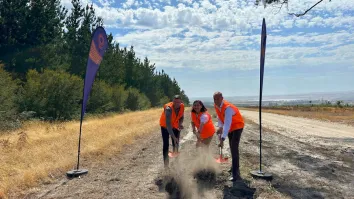Asia’s renewable push hindered by policy gaps and infrastructure costs
Regulatory hurdles and ageing grids slow progress in the region.
Southeast Asia’s ambitions to transition to renewable energy face significant setbacks, with experts pointing to policy gaps, ageing infrastructure, and high transmission costs as key barriers.
Despite advancements in battery storage and declining costs of renewable technologies, market and regulatory uncertainty threaten to derail the region’s clean energy goals.
Battery storage alone isn’t enough
“We see a boom in battery storage...all across different countries in the region,” said Edward Zhao, Global Vice President of Univers. He emphasised that while battery energy storage systems (BESS) are essential, effective integration requires more than just hardware. “We need multi-technology solutions... integrating IT, operational, and energy technology,” Zhao noted, stressing that without coordinated efforts, batteries alone will not stabilise the grid.
Meanwhile, Indonesia, Malaysia, and the Philippines have begun pilot battery projects to address intermittent power from solar and wind sources. “But Southeast Asia still remains in its preliminary stages of transition,” said Aditya Lolla, Asia Programme Director at Ember. He added that to meet climate targets, the region must triple or even sextuple its renewable capacity by 2035.
One of the most pressing issues is the lack of policy certainty, which discourages private investment. Naomi Hirose, Chair of Impact at the World Energy Council, explained: “Private industry investors remain cautious about covering the additional cost of battery storage unless supported by bankable, transparent purchasing agreements or market incentives.”
Grid infrastructure is holding back renewables
Experts agree that existing infrastructure in many parts of Asia is unfit for the demands of renewable energy. “Grid infrastructure...is designed for centralised fossil fuel-based generation,” Lolla said. “Modernising these grids to accommodate clean energy will require significant investment.” He also warned that without clear regulatory frameworks, attracting such investments would be difficult.
Transmission costs present another bottleneck. “The cost of building a transmission line is said to be 100 times more expensive than optical fibre cable construction,” Hirose revealed. She suggested building data centres near power sources to reduce costs and emissions, while transmitting data to urban areas via fibre optics.
“When renewable energy generation exceeds demand, a battery can store the excess and release it during shortfalls,” Lolla explained. However, he emphasised that the region’s grids need robust management to cope with the unpredictable nature of these energy sources.
Experts suggest that integrating renewables will require not just better technology, but also a shift in regulatory and financial structures. “Efforts should first be made to use electricity when generated, before determining storage needs,” Hirose advised, proposing strategies like optimised EV charging and heat storage.
While falling costs and pilot projects offer hope, Asia’s clean energy transition will hinge on overcoming regulatory and infrastructure bottlenecks. Without swift action, the region risks falling behind its climate goals, despite its renewable potential. “The market needs certainty,” Lolla warned. “And that is lacking in most Asian countries.”



















 Advertise
Advertise







